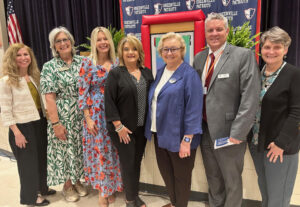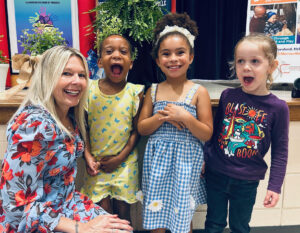
When a passionate new Georgia Family Connection coordinator participates in a peer-to-peer presentation, sometimes lightning strikes. That’s exactly what happened in 2017 when Rhonda Denton, in her new role as executive director of Meriwether County Family Connection, learned about Troup County’s efforts with Get Georgia Reading—Campaign for Grade-Level Reading. Inspired, she embraced a new way of thinking about community impact.
Meriwether County Family Connection brought community leaders and families together this summer for the Get Meriwether Reading Summit 2025—High Five for Literacy—to celebrate five years of progress. But this summit was about more than literacy. It was about building a thriving future for all families.
Some of the most serious challenges Meriwether County faces involve maternal and infant health outcomes. The county’s low birthweight rate—the strongest predictor of infant mortality and a window into women’s overall health—is 15.7%, above the state average of 10.2%. Premature births (15.3%), teen births (13.4%), and inadequate prenatal care (18.9%) reflect broader public health issues that directly impact children’s long-term development.
This data led Meriwether County Family Connection to adopt three core strategies to address early literacy, women’s and infant health, and family stability. Partners are working together to:
- decrease the number of babies born with low birthweight,
- decrease incidents of substantiated child neglect,
- increase the percentage of third-grade students achieving Proficient Learner or above on Milestones ELA assessments, and
- improve kindergarten readiness.
“Our event celebrated our progress and successes over the past five years promoting women’s and infant health and early literacy,” said Denton. “We’ve been working with our partners and community to make Meriwether a great place to live, work, and thrive. I’m so proud of the programs and services we’ve been able to bring to our families.”
Early Learning and Early Literacy Efforts Begin Before Birth
Targeting families from birth through age 8 matters because these are the years that shape high school completion, workforce development, and the ability to contribute to a thriving community.
“One thing we discovered in launching our Get Meriwether Reading initiative is the direct connection to prenatal care,” said Angie Shirah, Early Literacy and Women’s Health Coordinator. “We start working with women before they conceive—encouraging healthy habits and reproductive life planning—so they can give birth to healthy babies. We then support them through every developmental milestone so those children will be ready to start school.
Carolyn McKinley of the Meriwether Chamber of Commerce recalled reading an article titled “Workforce Development Begins in the Crib” that greatly impacted her outlook. “That’s when it clicked—no, that’s even too late. It starts in the womb,” McKinley said. “Workforce development has always been a high priority for chambers across the country—but that shift in thinking helped us build the systemic, connected approach we now have in Meriwether.”
Meriwether County Family Connection joined Georgia Family Connection Partnership’s (GaFCP) Promoting Women’s Health and Healthy Births Cohort, working with partners to build activities to improve women’s health and birth outcomes.
GaFCP and CareSource Georgia have teamed up to improve maternal and infant health outcomes in rural Georgia through technology-driven engagement and community-based collaboration. Meriwether is now one of 12 embedding the GoMo Health platform to create a virtual engagement hub. This hub coordinates health communications and supports collaboration between health care providers and community organizations.
“I enjoy working in community partnerships because I get to hear directly from educators, caregivers, and parents about their needs,” said Department of Early Care and Learning Director Bridgette Washington-Collier. “Georgia Family Connection helps ensure everyone—from home-based caregivers to licensed centers—has access to tools and programs that support child development and early literacy.”
Meriwether County Family Connection’s most successful early literacy programs include:
- the Reading Rangers program, which pairs volunteers with at-risk students in pre-K through second grade to improve reading;
- Community Baby Shower events that provide families with resources and parent education to women of childbearing age along with free books, diapers, and other baby items;
- the Summer Read & Feed program with the Meriwether County School System (MCSS), which provides books alongside meals at school nutrition sites;
- school events like the Back to School Bash that provide school supplies and promotes Get Meriwether Reading and pre-K registration; and
- the Reading Cubs program, which allows all children up to age 4 to receive literacy kits, flashcards, and learning activities to prepare them for pre-K.

“Language matters,” said Washington-Collier. “If I’m able to show and model for a parent how to talk about the food a child sitting in a highchair is eating, how to engage that child in conversation or just cooing, that’s an opportunity to share language with a child and demonstrate the importance of literacy with a parent.”
Readying Reading Cubs for Success in School and Beyond
The Reading Cubs program is supported by the local Rotary Club and funded by the Sandra Dunagan Deal Center for Early Language and Literacy at Georgia College and State University’s Community Coalition Grant Initiative. Through this investment, the Deal Center propels projects that foster cross-sector collaboration to advance developmental-focused practices.
The Reading Cubs program is designed to develop vocabulary, improve language comprehension, equip parents and caregivers with literacy tools, support development milestones, and transition children into kindergarten. The program models activities for children from birth to age 4 at early learning centers, community spaces, and public pre-K classrooms to bolster pre-K and kindergarten readiness. Mobile programming and outreach to underserved areas are available county-wide.
The Reading Cubs program hosts activities and events like family cooking classes and Digging with Dad Gardening, a gardening program for children and their male caregivers that integrates literacy and vocabulary through themed books.
“Dads, grandads, uncles, and other male role models are out there trying to earn a living for their families, but they take time to come out to do that—and you can tell it makes a special difference in the children’s lives,” said Shirah.
Participants celebrated Reading Cubs and their families at the High Five for Literacy event.
Harnessing Connections to Make Lasting Change
When Meriwether County Family Connection applied for, but didn’t receive, a grant to purchase mobile kitchens to enhance literacy nights with families by teaching them about wellness and eating healthy, MCSS Superintendent Robert Griffin wrote the cost of those kitchens into the 2025-26 school system budget.
“Other counties will ask how that happened,” said Shirah. “Dr. Griffin, who believes deeply in the critical birth-to-8 timeline, approached Family Connection to see how we work together to make a difference in our students’ lives. Our school system is pouring love into the families before a baby is even conceived.”
State Representative Debbie Buckner (D-Junction City) praised Meriwether’s approach. “I’m also a public health educator, so I understand the connections to health, to maternal health, to reading to babies before they’re born. One of the first Georgia Family Connection Collaboratives in the state was in Columbus. We met with the Division of Family & Children Services, board of education, and health department in their combined library and board room”—the perfect venue, according to Buckner. “I thought it was important for our board members to sit around the table to talk about what we needed to do for public health, and to be reminded that there was more for all of us to learn. This work isn’t just about reading—it’s about health, connection, and the future of our communities. This is a job for all of us.”
As Meriwether County Family Connection celebrates five years of the Get Meriwether Reading initiative and continues to focus on early literacy, women’s and infant health, and family stability, Shirah is calling on others across the state to make meaningful connections that will benefit all children and families.
“We encourage other counties, with help from GaFCP, to be relentless in your pursuit of what you’ve determined you’re going to do, develop your action plan, and connect with your school system. Get to know you’re superintendent and assistant superintendent and make yourself readily available to them. Building those relationships builds a strong foundation for your work, and it’s going to make a direct impact on the lives of children and families from birth and beyond.”
To learn more about Meriwether County Family Connection and Get Meriwether Reading, contact Denton at meriwetherfamilyconnection@gmail.com.
Read and share “CareSource Georgia Collaborates with GaFCP to Improve Maternal and Infant Health in Rural Georgia.”
Read and share “Child Poverty Rates and Low Literacy Scores Rouse Meriwether County Family Connection to Shift Strategy.”
Contact:
Bill Valladares
GaFCP Communications Director
678-326-2538
william@gafcp.org
Follow us on X: @gafcpnews
Connect with us on Facebook.
